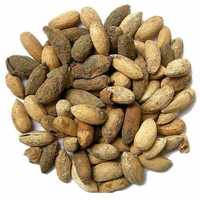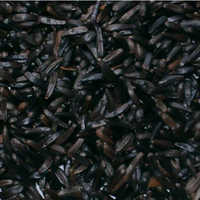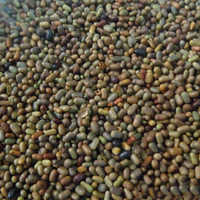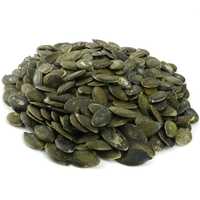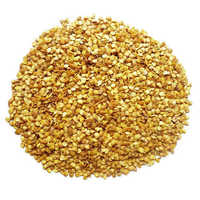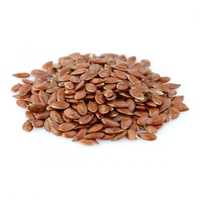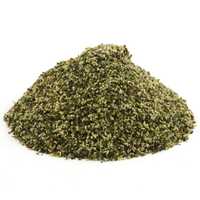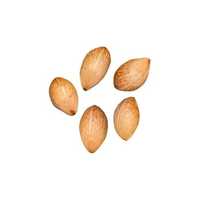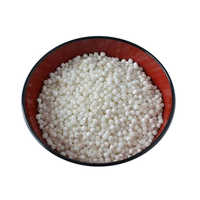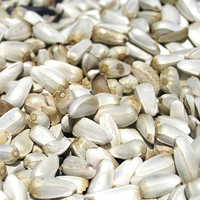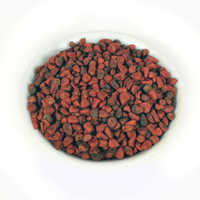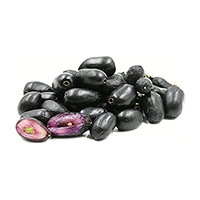Plant Seeds
(385 products)
Explore More Categories
Made in India
Aonla Fruit Seeds ( Emblica Officinalis ) Purity: 100%
Price: 1300 INR (Approx.)/Kilograms
MOQ - 5 Kilograms/Kilograms
Cultivation Type - Other
Variety - Other
Edible - Yes
13 Years
Business Type: Trading Company
Greenfields Herbal Grass and Forestry Seeds
Indian Inquiries Only
Psyllium Seeds
16 Years
Business Type: Manufacturer | Exporter
SHREEOSWAL PSYLLIUM EXPORTS INDIA LIMITED
High Grade Pumpkin Seed
MOQ - 18MT MT
10 Years
Business Type: Manufacturer | Distributor
RIHKSMAYOR IMPORT AND EXPORT (PTY) LTD.
Flax Seeds Grade: First Class
Price: 220 INR (Approx.)/Kilograms
MOQ - 100 Kilograms/Kilograms
Product Type - Fresh
Shape - Granule
Processing - Raw
Business Type: Manufacturer | Distributor
JAMBIANI GROUP LIMITED
Dianthus Chaubaud Mixed Flower Seeds
Business Type: Manufacturer
BIOCARVE SEEDS
Castor Seeds
Price: 250 INR (Approx.)/Kilograms
MOQ - 10 Kilograms/Kilograms
Business Type: Manufacturer | Distributor
PIONEER AGRO INDUSTRY
Tulsi Leaves
Price Trend: 500.00 - 700.00 INR (Approx.)/Box
MOQ - 10 Box/Boxes
Business Type: Distributor
PJ Enterprises
High Quality Pumpkin Seeds
Business Type: Manufacturer | Distributor
VERDANT SEEDS & CHEMICALS PVT. LTD.
Maruti Bittergourd Seeds Maruti 61 F1 Hybrid
Business Type: Manufacturer | Supplier
MARUTI AGRI SEEDS
Kasuri Methi
Business Type: Manufacturer | Supplier
GANDHI SPICES PVT. LTD.
Kigelia Pinnata
Price: 5000 INR (Approx.)/Kilograms
MOQ - 1 Kilograms/Kilograms
Business Type: Manufacturer | Exporter
NEEL KANTH AGRO FORESTRY
Common Sarpagandha Seed
Price Trend: 185.00 - 500.00 INR (Approx.)/Kilograms
MOQ - 100 Kilograms/Kilograms
Cultivation Type - Common
Business Type: Manufacturer | Distributor
OM SAI WATER AND HERBAL SOLUTIONS
BLACK KARINA Watermelon Seed
Business Type: Manufacturer | Distributor
SAGAR BIOTECH PRIVATE LIMITED
Hybrid Plant Seeds
Business Type: Manufacturer | Distributor
MAHARASHTRA HYBRID SEEDS CO PVT. LTD.
Flax Seeds
Business Type: Manufacturer | Supplier
Calpro Foods Pvt. Ltd.
High Grade Psyllium Husk
Price: 2000 USD ($) (Approx.)/Metric Ton
MOQ - 1 Metric Ton/Metric Tons
Business Type: Exporter | Trading Company
HKR ENTERPRISE
Manjistha(Indian Madder) Powder
Business Type: Manufacturer | Exporter
Paras oil Extraction Pvt Ltd
Organic Noni Juice Morinda Citrofolia
Price: 70 INR (Approx.)/Kilograms
MOQ - 10 Kilograms/Kilograms
Cultivation Type - Organic
Edible - Yes
Hybrid - No
Business Type: Manufacturer | Distributor
MAHADEV ENTERPRISES
Pumpkin Seeds
Business Type: Manufacturer
Bright Lifecare Pvt. Ltd.
Oil Soluble Annatto Seeds
Business Type: Manufacturer | Supplier
KOLOR JET CHEMICAL PVT. LTD.
Verified Exporter
( Accepts only Foreign Inquiry)
Sesame Seed
Business Type: Manufacturer | Exporter
Navneet Impex
Fennel Seeds
Business Type: Manufacturer | Supplier
Raj Foods International
Bajra Seed
Business Type: Manufacturer | Supplier
MICROPLEX AGRO CHEMICALS & FERTILIZERS
Brown Flax Seeds / Linseeds
Business Type: Manufacturer | Supplier
Acura Enterprises Pvt. Ltd.
Flower Seeds
Business Type: Supplier | Trading Company
Garden Blossom
Flax Seed
Business Type: Manufacturer | Supplier
Konark Fixtures Limited
Common Adenium Seeds
Product Type - Adenium Seeds
Cultivation Type - Common
Business Type: Supplier | Trading Company
Badsha Enterprise
Cedrus Deodara
Business Type: Manufacturer | Exporter
HORTICULTURAL IMPEX
Verified Exporter
( Accepts only Foreign Inquiry)
Plant Seeds Manufacturers | Suppliers in India
| Company Name | Location | Member Since |
|---|---|---|
| Shreeoswal Psyllium Exports India Limited | Neemuch, India | 16 Years |
| Greenfields Herbal Grass And Forestry Seeds | Jabalpur, India | 13 Years |
| Rihksmayor Import And Export (Pty) Ltd. | Johannesburg, South Africa | 10 Years |
The Science of Plant Seeds: Anatomy and Function
The complicated architecture and vital activities of plant seeds make them a fascinating topic in plant science. Understanding the anatomy and function of seeds can help us better understand how plants reproduce, spread, and survive. Seeds are exceptional in their capacity to safeguard, hydrate and generate new plants. The seed coat, embryo, and endosperm are commonly included in the anatomy of plant seeds. The fragile embryo and endosperm are protected from harm and the elements by the seed coat, which serves as a barrier. The embryo which consists of the radicle, plumule and cotyledons is the growing plant inside the seed. The embryo receives nourishment from the endosperm, a storage tissue. Plant seeds perform crucial functions, including reproduction, dispersal, and survival. They enable plants to reproduce and propagate, disperse to new areas for colonization, and survive adverse conditions through mechanisms such as dormancy and nutrient reserves.
The Life Cycle of a Plant Seed: From Germination to Growth
The life cycle of a plant seed is a fascinating process that commences with germination and finishes with the development of an entirely new plant. Germination is the procedure by which a seed grows into a plant. It begins when the optimum circumstances for growth, like water, climate, and air, are present. The radicle, the embryonic root, emerges first during germination, followed by the plumule, which eventually becomes the shoot system. The shoot system expands upward in search of light for photosynthesis as the root system expands downward to take water and nutrients from the soil. The seed leaves, or cotyledons, supply fuel and nutrients to sustain early development. Real leaves emerge as plant also grows stems, branches, and roots. The plant grows naturally, generating new stems, roots, and leaves in addition to eventually making fruit and blossoms that help in reproduction.
Types of Plant Seeds
There are numerous varieties, sizes, and kinds of plant seeds. They constitute the output of a plant's reproductive processes and function as a mode of propagation, enabling the growth of new plants. Here are a few typical seed kinds for plants:
Monocotyledonous Seeds: These seeds originated from monocotyledonous plants, a class of plants that comprises grasses, lilies, and orchids.
Diacotyledonous Seeds: A lot of flowering plants, like roses, beans, and sunflowers, which are members of the dicotyledonous group, which is where these seeds emerge from.
Gymnosperm seeds: A class of flowerless, seed-producing plants also known as gymnosperms release seeds.
Angiosperm Seeds: Flowering plants called angiosperms make seeds that have been enclosed in a fruit. According to the structure they possess, angiosperm seeds could be further divided into various groups, such as legume seeds, nut seeds, and berry seeds.
Epiphytic Seeds: Epiphytic seeds frequently have particular characteristics which allow them to cling to surfaces and receive resources from their surrounding environment and precipitation.
Apart from these seeds used in farming, there are seeds that are used for consumption, such as flax seeds and pumpkin seeds.
The Importance of Genetic Diversity in Plant Seeds
For plant populations and ecosystems to be healthy and resilient, genetic diversity in plant seeds is essential. It includes the diversity of genetic data that is present in a species or population of plants and is crucial for the survival and adaptation of diverse plant traits.
The capacity to adapt to shifting surroundings is one of the primary benefits of genetic variation in plant seeds. Genetic variety offers the essential raw materials for natural selection to work upon as environmental conditions change as a result of variables like climate change. There is a greater chance that individuals from seeds with a variety of genetic features may survive and thrive in variable environments. As a result, plant populations can change and adapt to environmental difficulties.
The Role of Plant Seeds in Sustainable Agriculture
If farmers want to conserve the seeds for subsequent planting, they are required to pick seeds from plants that possess the desired qualities, such as excellent yields, illness resistance, or the ability to withstand drought. This method called seed saving helps farmers to slowly adapt their crops to specific conditions while improving their agricultural yield and decreasing dependence on other resources. Another sustainable seed technology is innovative with the purpose to elevate the seed strength and improve crop yield without causing any harm to the ecosystem is called seed priming.
FAQs: Plant Seeds
Q. What is a plant seed?
Ans. The generative element called a plant seed, which is meant for dispersal and regrowth, is composed of an embryo, endosperm, and seed coating. The shapes, sizes, and physical features of seeds allow them to resist harsh conditions and germinate when all that is needed are offered.
Q. What is the difference between open-pollinated and hybrid plant seeds?
Ans. Open-pollinated and hybrid plant seeds differ from one another in terms of their genetic makeup and production methods. Open-pollinated seeds come from plants that were pollinated naturally, without the help of humans, by wind, insects, or other natural agents. On the other hand, human-controlled crossbreeding of two or more distinct plant species or kinds results in hybrid seeds.
Q. What are GMO seeds and are they safe?
Ans. GMO seeds are plant seeds that have undergone genetic engineering through biotechnology to add desirable features or qualities, such as increased nutritional value or longer shelf life. To obtain the desired features, GMO seeds are made by adding or changing genes in the DNA of the plant.
GMO seed safety is a controversial issue that is always changing and has many varying viewpoints. Critics raise worries about potential hazards while supporters note potential advantages and regulatory monitoring. To assess the safety of GMO seeds in various situations and guarantee their responsible and sustainable usage, further investigation, observation, and regulatory control are required.
Q. How do I save plant seeds for future use?
Ans. A practical and environmentally responsible strategy to maintain the genetic variety of plants and guarantee a steady supply of seeds for the next planting season is to save plant seeds for later use. Harvest ripe seeds from healthy plants to preserve plant seeds. After cleaning the seeds by delicately removing plant matter and dirt, let them completely dry in a well-ventilated place. When egg plant seeds, papaya plant seeds, wheat plant seeds, lady finger seeds and more are completely dry, keep them in marked containers or envelopes in a cold, dry, and dark location. Conduct germination tests to determine the viability of the stored seeds before planting them in upcoming seasons. Regularly check the stored seeds for any indications of moisture, mildew, or pests.
Related Categories
Agricultural Machines & Tools
Agriculture & By-product Agents
Agriculture Product Stocks
Agro Chemicals
Agro Products & Commodities
Animal Casings
Animal Extract
Animal Fodders
Animal Husbandry
Animal Products
Aquaculture Equipment & Supplies
Aquatic Products
Bactericides
Bamboo & Rattan Products
Beans
Cashews
Cattle Feed Supplements
Cereals
Coconut
Coconut Shell Products
Coffee
Coir Blocks
Coir Fiber
Coir Products
Coir Rope
Dehydrated Vegetables
Dried Vegetables
EMU & EMU Products
EMU Eggs
EMU Meat
EMU Oil Products
Eggs
Farm Machinery
Farm Machinery Parts
Fertilizers
Fodder & Feed Additives
Fresh Fruits
Fresh Vegetables
Frozen & Dried Fruit
Frozen Vegetables
Fungicides
Garden Accessories
Grain
Greenhouse Supplies & Equipment
Guar Gum
Herbicides
Horticulture & Gardening Tools
Horticulture, Gardening & Irrigation Machinery
Insecticides
Irrigation Systems
Jute Products
Livestock
Molasses
Mushroom & Truffle
Nematicides
Nuts & Kernels
Oil Seed Extraction Machinery
Organic Vegetables
Pesticides
Plant & Animal Oil
Plant Extract
Plant Growth Regulator
Plant Seeds
Plant, Flowers & Dried Flowers
Potpourri
Poultry Equipment
Poultry Feed Supplements
Pulses
Raw Cotton & Cotton Waste
Rice
Seed Processing Machinery
Seeds
Shade Net
Soil Conditioners
Storage Silos
Tea
Tractor Parts
Tractors
Wheat
